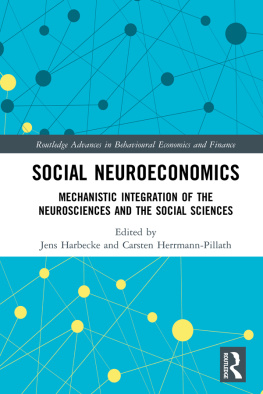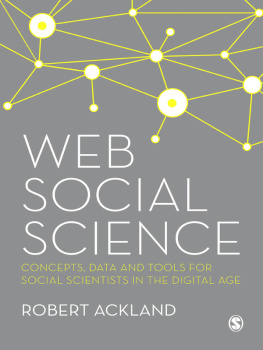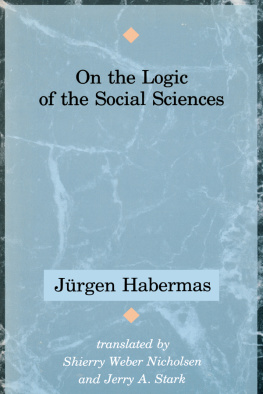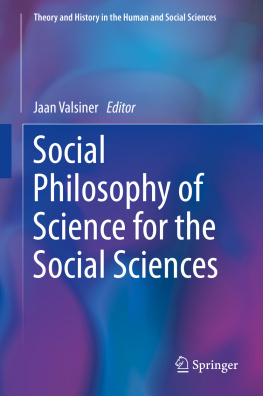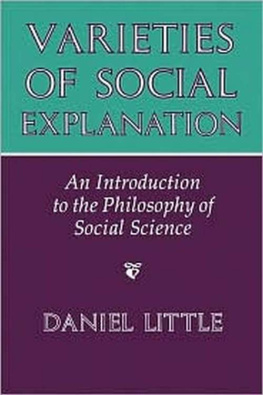ROUTLEDGE LIBRARY EDITIONS:
SOCIAL THEORY
Volume 34
INTRODUCTION TO THE
SOCIAL SCIENCES
INTRODUCTION TO THE
SOCIAL SCIENCES
With Special Reference to their Methods
MAURICE DUVERGER
Translated by
MALCOLM ANDERSON
First published in 1964
This edition first published in 2015
by Routledge
2 Park Square, Milton Park, Abingdon, Oxon, OX14 4RN
and by Routledge
52 Vanderbilt Avenue, New York, NY 10017
Routledge is an imprint of the Taylor & Francis Group, an informa business
1964 George Allen & Unwin Ltd
All rights reserved. No part of this book may be reprinted or reproduced or utilised in any form or by any electronic, mechanical, or other means, now known or hereafter invented, including photocopying and recording, or in any information storage or retrieval system, without permission in writing from the publishers.
Trademark notice: Product or corporate names may be trademarks or registered trademarks, and are used only for identification and explanation without intent to infringe.
British Library Cataloguing in Publication Data
A catalogue record for this book is available from the British Library
ISBN: 978-0-415-72731-0 (Set)
eISBN: 978-1-315-76997-4 (Set)
ISBN: 978-1-138-78744-5 (Volume 34)
Publishers Note
The publisher has gone to great lengths to ensure the quality of this reprint but points out that some imperfections in the original copies may be apparent.
Publishers Note
The publisher has made every effort to trace copyright holders and would welcome correspondence from those they have been unable to trace.
Introduction to
the Social Sciences
WITH SPECIAL REFERENCE TO THEIR METHODS
by
MAURICE DUVERGER
TRANSLATED BY
MALCOLM ANDERSON
M.A., D.Phil.
FIRST PUBLISHED IN ENGLISH 1964
This book is copyright under the Berne Convention. Apart from any fair dealing for the purposes of private study, research, criticism or review, as permitted under the Copyright Act, 1956, no portion may be reproduced by any process without written permission. Enquiries should be made to the publisher.
This translation George Allen & Unwin Ltd, 1964
Translated from the French
METHODES DES SCIENCES SOCIALES
first published 1961
French original 1959 and 1961 Presses Universitaires de France
PRINTED IN GREAT BRITAIN
in 10 point Times Roman
BY SIMSON SHAND LTD
LONDON, HERTFORD AND HARLOW
CONTENTS
INTRODUCTION
THE SOCIAL SCIENCES
In the world today the social sciences have even more important application than nuclear physics. The techniques of propaganda in totalitarian states, advertising in capitalist countries, public relations, revolutionary war and psychological action have transformed human life even more than nuclear fission.
However, the relative position of theory and practice differ between the social and the physical sciences. In the physical sciences progress in theory precedes practical application; the reverse is the case in the social sciences where practice seems more advanced than theory. There is a striking contrast between the effectiveness of the applied social sciences and the anarchic state of their theory: sociologists are not even agreed on elementary definitions and basic concepts. Each sociologist talks his own language and this makes communication between sociologists difficult. This is doubtless explained by the backwardness of the social sciences compared with the physical sciencesthere was a time when practice was in advance of theory even in the physical sciences.
In spite of the importance of their contemporary application, social sciences appear in some respects to be underdeveloped sciences. This is probably a temporary situation but it exists and seems likely to last for some time: it must therefore be taken into account. Whilst it makes absolutely necessary an attempt at a definition of the social sciences before examining their techniques and methods of research, it also makes this attempt very difficult. To avoid increasing the confusion a new definition, new concepts, new classifications must not be added to those already in existence. Our aim must be to look for features common to them all.
At first sight, the notion of social science seems easy to define: the social sciences study men living in society, Aristotles political animal, and they are thus concerned with the analysis of human groups, collectivities and communities. But even the notion of a human group is not easy to define. If we suggest, for example, a simple agglomeration of individuals it can be objected that a cinema queue is not a real collectivityalthough it could become one. Also, the statements that the social sciences are the study of man in society and that they analyse human groups are not synonymous: the stress is placed on the members of the group in the first and on the community in the second.
To avoid becoming involved in the serious and persistent controversies about the object and nature of the social sciences, a partial definition will be constructed by tackling the problem in a genetic manner. Firstly, the historical development of the social sciences will be traced so that discussions of their object and nature can be put in a context. Secondly, as the definition of the social sciences, the sciences of social phenomena, is the most neutral and the most generally accepted, a definition of the general character of social phenomena will be attempted. This brings us to discussions about the definition of social phenomena but these will now be more concrete.
I am attempting only a schematic and superficial outline, the sole purpose of which is to help understanding of actual difficulties of definition of social phenomena. In this context it is essential to appreciate two things: (1) the primitive confusion, which persisted for centuries, of the objective scientific with the moral and meta-physical; (2) the recent tendency towards splintering into many specialized disciplines, replacing social science by the social sciences. With these as guiding considerations we can delineate three great periodswhich are not clearly separated and it is not therefore possible to date the periods exactly.
Originally the rules of social organization such as they ought to be, rather than of social organization as it exists, were sought. In other words social philosophy rather than social science was practised. This attitude persisted for centuries and has not entirely disappeared. Until the eighteenth century, the authors in whose work a scientific rather than a philosophical attitude predominated were very few in number. After the eighteenth century the number increased considerably; in the nineteenth century the scientific attitude began to predominate.
(a) THE GENERAL CHARACTERISTICS OF THE PERIOD
To embark on the study of the principles of an ideal organization, it is necessary in the first place to study the working of existing social organizations: social philosophers were thus drawn towards social science.


